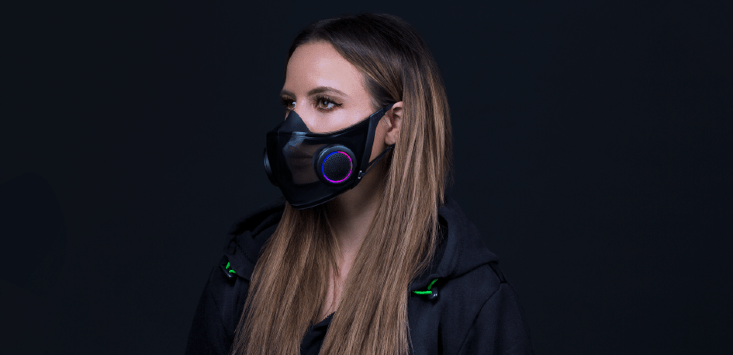
Razer's Project Hazel face mask. Source: Razer.
CES may have looked a little different in 2021, as COVID-19 drove exhibitions and keynote speeches online.
But, the challenges of 2020 drove creativity and innovation, and some of the tech coming out of this year’s conference highlighted some of the areas that have advanced exponentially.
And while some things change, some things stay the same, and new smartphone tech, advances in autonomous vehicles and — of course — lots and lots of robots remain a fixture, too.
Here are some of our highlights.
Masks, masks and more masks
Of course, much of this year’s tech was shaped by the ongoing COVID-19 pandemic. This was made particularly clear in the sheer abundance of mask-tech (a combination of words we wouldn’t have dreamed of putting together this time last year).
The AirPop Active+ mask monitors your respiration, and connects to your smartphone, reporting on any changes, the level of pollutants in the air, and alerting you when a filter needs changing.
LG has revealed its full wearable air purifier, while MaskFone (rather self evidently) combines Bluetooth earbuds with a microphone, allowing wearers to chat unencumbered under their face covering.
Elsewhere, Razer’s transparent and super-futuristic Project Hazel mask comes adorned with LEDs — including to light up a person’s mouth while they’re speaking.
A microphone also amplifies the wearer’s voice, while a charging case also activates a UV light to sterilise the mask between uses.
Rolly phone
Remember the furore around Samsung’s foldable phone? This year, LG has paired up with Chinese electronics brand TCL to go one step further, creating a rollable phone screen.
The screen appears to roll away into the phone case, changing the screen size. And, while not much information is available on the tech, or just how robust these screens will be, it’s expected to be rolled out to the public at some point this year.
The LG Rollable isn’t officially unveiled yet, but it was teased this morning at #ces2021 pic.twitter.com/XJ9bAbUq6b
— Nicholas Gray (@nickmgray) January 11, 2021
Lab-grown breast milk
Founded by a food scientist and a cell biologist, BioMilq is taking the lab-grown food trend one step further. Or perhaps, one step back. Rather than striving to produce super-realistic burgers, this startup is cultivating personalised breast milk for tiny humans.
The startup can collect mammary epithelial cells from a woman while she’s pregnant, and cultivate milk for her specific child.
It’s intended to abate some of the logistical and physical challenges women face while breastfeeding, while also taking some of the social pressure off, too.
The system is also designed to be more environmentally friendly than formula.
This business recently bagged US$3.5 million to optimise its processes and grow its team, and we expect to hear a lot more from in 2021.
Lidar and chips
OK, so a new chip on the block may not immediately sound groundbreaking. But, last week, Mobileye, a self-driving car company acquired by chipmaker Intel back in 2017, announced it has found a way to put its full lidar system on one tiny chip.
That’s potentially the first step in driving down the cost of the sensors that afford autonomy to self-driving cars.
Sure, it’s not perfected yet, but this is a teeny bit of tech that could reflect a leap forward for the self-driving car sector, and we’re here for it.
Robot friends
Finally, CES wouldn’t be CES without a full suite of new robot friends. Samsung unveiled its Bot Handy robot butler, which we’re told can both load the dishwasher and pour you a glass of wine.
The tech giant also showcased its AI vacuum cleaner, designed to be a self-emptying automation upgrade on your average Roomba, while also doubling up as a security camera and pet-watcher while you’re out of the house.
For something with a little more personality and a little less practical application, the Moorebot Scout whizzes around your home with a camera attached, while the cute and fuzzy Moflin and Petit Qoobo robo pets are basically designed only to snuggle and purr.
Elsewhere, ITRI’s Dual Arm Robot system has hands that function basically in the same way as humans. That means it can perform all manner of human-ish tasks. But, for now, it plays a mean tune on the piano.
Handpicked for you

The remote-work revolution has increased digital overload. Here’s how to manage it



COMMENTS
SmartCompany is committed to hosting lively discussions. Help us keep the conversation useful, interesting and welcoming. We aim to publish comments quickly in the interest of promoting robust conversation, but we’re a small team and we deploy filters to protect against legal risk. Occasionally your comment may be held up while it is being reviewed, but we’re working as fast as we can to keep the conversation rolling.
The SmartCompany comment section is members-only content. Please subscribe to leave a comment.
The SmartCompany comment section is members-only content. Please login to leave a comment.